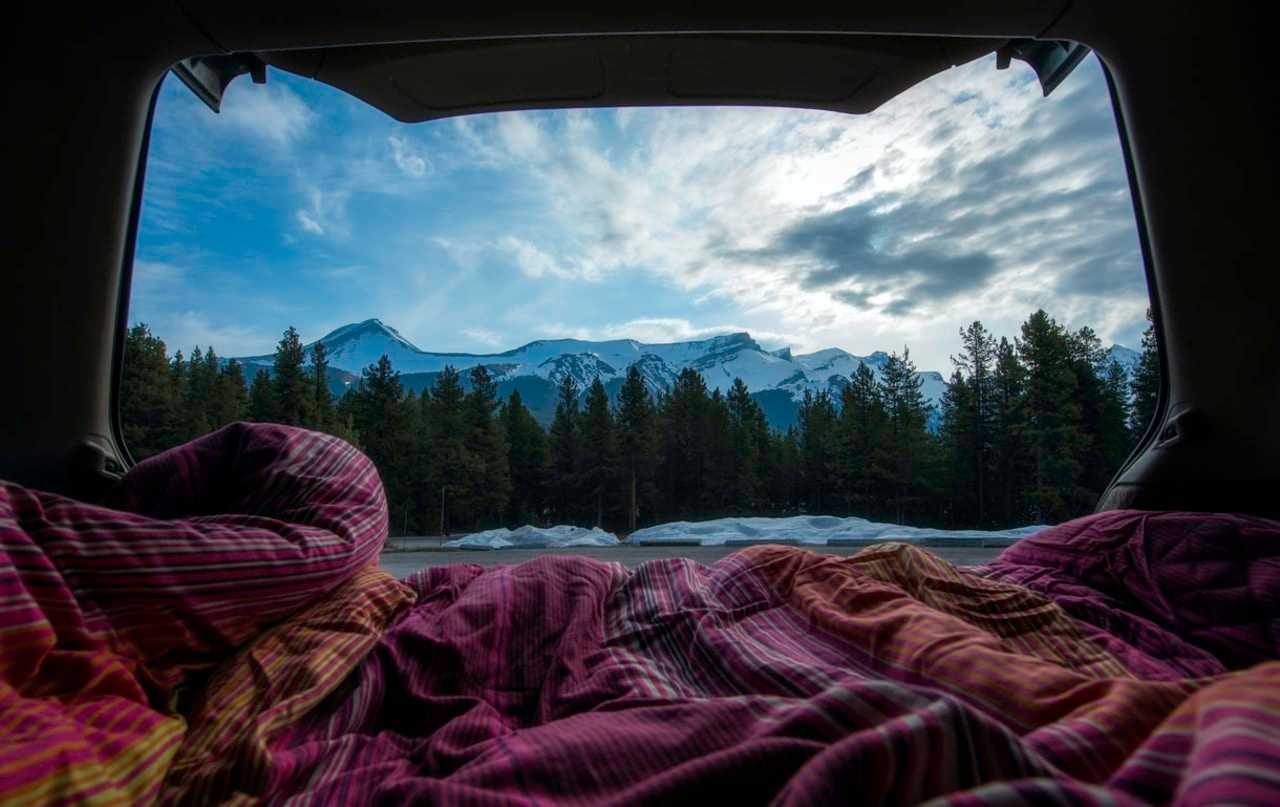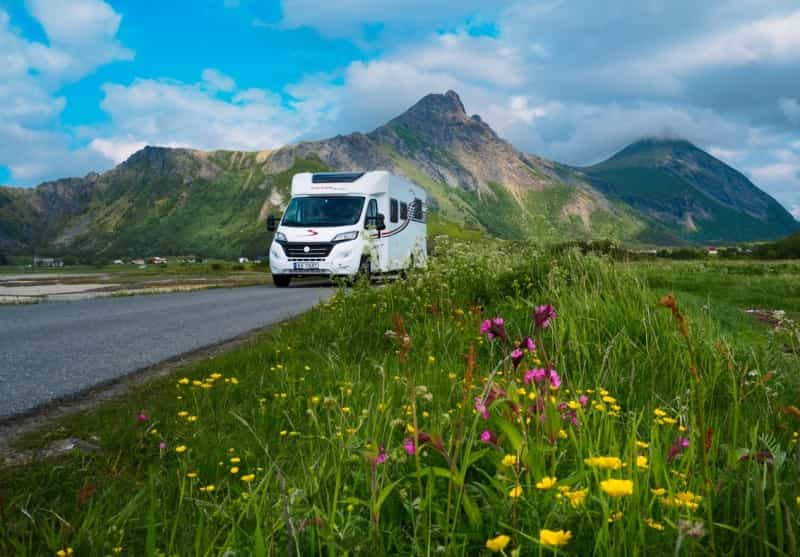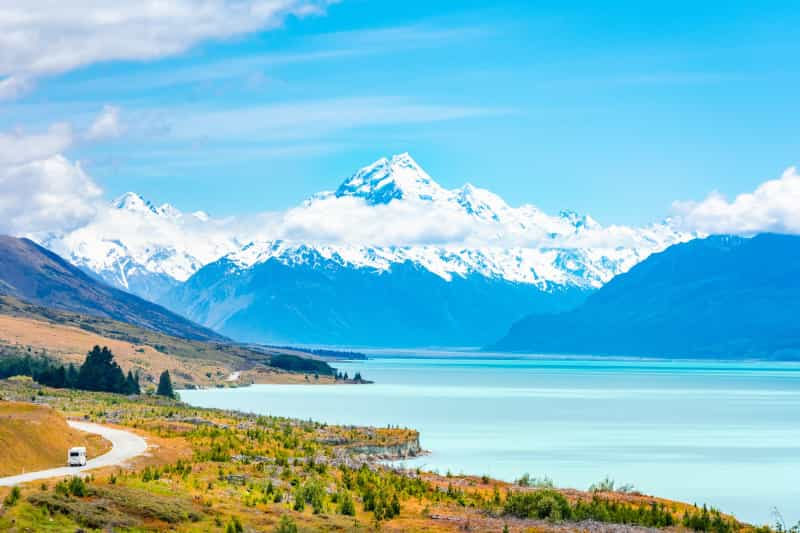Wild camping in a motorhome or campervan
Wild camping is all about setting up a tent anywhere other than an approved campsite, usually in the middle of nature. But it’s also possible to get off the grid in a motorhome or campervan. In fact, it can be easier – especially if you have your own bathroom facilities on board.
Wild camping in a motorhome or campervan isn't always legal, however, so it’s best to brush up on the rules before you set off exploring.

Why go wild camping in a motorhome or campervan?
Most people like to wild camp in their van for the freedom it affords. Picture the scene: you’re surrounded by the sights and scents of the great outdoors with not another soul around. And while you can also experience this in a tent, sleeping overnight in a motorhome or campervan means no setup and takedown is needed, and it gives you some protection from weather and wildlife.
It’s also convenient in other ways – if you’re arriving late in the evening and planning to leave early in the morning, you can park up enroute to your eventual destination rather than finding a designated campsite.
Another reason the #vanlife crowd love off-grid camping in a motorhome is because it's almost always free. If you’re on a budget, there’s no cheaper way to travel.
But there is a caveat. Sometimes you’ll be able to find the ideal wild spot with free parking for motorhomes, but on other occasions staying at a campsite will make more sense. For the perfect combination, you could intersperse nights of wild camping in your van with stays at official sites for access to conveniences like waste disposal, running water, showers and electricity.
Is wild camping in a motorhome allowed?
It depends on the country and type of area you’re free parking in. Wild camping in the middle of nature is usually quite restricted in a campervan, but there are often looser rules about simply sleeping overnight at the roadside.
Here’s a breakdown of where you can and can’t legally free camp in a motorhome.
Wild camping for motorhomes in the UK
England
Although it's a civil rather than criminal offence, wild camping in a motorhome, touring caravan or campervan is technically illegal in England unless you’ve asked the landowner for permission. This could be one person or a bigger entity such as the Crown Estate or National Trust.
There’s no law stipulating that you can’t stay on the side of the road in your rolling home, but you might still get moved along by the police.
There are also exceptions. You can’t free camp in a motorhome in English national parks like Dartmoor or the Lake District as they ban sleeping overnight in their laybys, at the roadside or in car parks. The rules are also actively enforced by rangers.
Wales
Wales follows the same rules as England. However, Brecon Beacons park authorities have put together a list of landowners willing to accept camping vehicles on their land, so it’s easier to get in touch with the right person for permission. Pick up a list from the visitor centre.
Scotland
Wild camping in a tent on unenclosed land is legal in Scotland, but this doesn’t extend to motorhomes, touring caravans or campervans. You can stay in certain areas of Loch Lomond and the Trossachs National Park between March and September with a camping permit, however. There are also free or low-cost motorhome stopovers to choose from.
Northern Ireland
Like in England, Wales and Scotland, wild camping in a motorhome is illegal in Northern Ireland unless you have the landowner’s permission. However, it’s allowed at some Northern Ireland Forestry Service sites if you organise your stay in advance.

Wild camping for motorhomes in Europe
Wild camping laws vary greatly depending on the European country you’re visiting, so check the laws for your chosen destination before driving off.
Lots of EU nations have special overnight parking spots for motorhomes, occasionally with drinking water and electric hook-ups, as well as chemical toilet and grey water disposal. Some have a 48-hour limit on how long you can stay. Motorhome and campervan stopovers are called ‘aires’ in France, ‘stellplätze’ in German-speaking nations and ‘sostas’ in Italy.
The best European country for wild camping in your motorhome or campervan is Norway, where the law of ‘allemansrätten’ means access to nature is a right. This means you'll be able to stay pretty much anywhere you like in the countryside, although you'll need to stay a certain distance from houses, along with sticking to other rules.
While Sweden also subscribes to allemansrätten, motorhomes and campers must park directly at the roadside or a rest area overnight instead of off-road.
You can sleep in your vehicle in Spain as long as the parking spot is suitable and there’s no sign banning you from staying overnight. You’re not able to sleep at national parks, however. Check the FURGOVW app for free motorhome camping locations reviewed by other travellers.
In France, wild camping in your vehicle is allowed with the landowner’s permission and the country has 6,000 aires for parking overnight in your motorhome. It’s not acceptable at the coast, on protected natural sites or near classified historic monuments, though.
Avoid illegally camping in your motorhome in Switzerland – the fines are up to €10,000.
Wild camping for motorhomes in the USA
Wild camping in a motorhome – often called ‘boondocking’ or ‘dispersed camping’ – is possible in some parts of the USA. You can stay at Bureau of Land Management (BLM) areas in national forests and grasslands for up to 21 days in a row. Free camping is also allowed in some national parks and national monument areas, but take a look at local regulations, especially between different states, as you might need a permit. It's important to note you can’t camp on Indian Reservation land.
Staying overnight in your campervan or motorhome on private land such as personal properties or company car parks is generally not permitted in the US. One exception is Wal-Mart, as long as you ask permission from the shop manager.
Wild camping for motorhomes in Australia and New Zealand
Wild camping in your vehicle is illegal in Australia, with fines as high as 10,000AUD. However, you can go free camping in your motorhome at designated places. Usually, these are locations with public bathrooms, like a restaurant or petrol station, or perhaps a rest stop at the side of the road. The CamperMate app has an extensive list.
You can also use the above app in New Zealand, or find government-approved places to freedom camp, which is typically allowed on Department of Conservation land. There are exceptions, like Maori burial sites and protected animal habitats. Certain councils let campers sleep on their land too, provided they stick to local rules.
There are some spots in New Zealand where wild camping is allowed if your vehicle is self-contained (ie, it has a toilet with a septic waste tank and a water container for greywater from the sink and shower). You’ll need to get a certificate showing it meets the NZS Self containment of motor caravans and caravans standard.

Top tips for wild camping in a motorhome or campervan
If you’re heading off the beaten path in your motorhome or campervan, here’s some extra advice to keep in mind.
-
Use apps like park4night to find peer-reviewed spots to sleep overnight in your campervan or motorhome for free
-
Be careful when driving off-road to wild camp – motorhomes and campervans aren’t designed for this
-
Don’t follow your GPS blindly as it can take you down roads that are too narrow for motorhomes
-
Download an app like Flush or Bathroom Scout to help you locate public toilets near you
-
Save your battery power by using as little electricity as possible when you're off-grid
-
Consider adding solar panels to your vehicle to help you wild camp for longer
-
Be respectful of your fellow neighbours by keeping the noise down
-
Lock your motorhome doors and windows when you leave camp, and hide possessions from view
-
Don’t use detergents to wash dishes near natural waterways
-
Abide by any ‘no camping’ and ‘no overnight parking’ signs you see – rulebreakers give the #vanlife community a bad name
Alternatives to wild camping in a motorhome or campervan
Nearly-wild campsites
The closest you can get to wild motorhome camping in countries that ban this practice is to choose a nearly-wild campsite. These are official options that accommodate campers who want a back-to-basics experience, usually at a low price. You can find them in the middle of national parks, on friendly farms and vineyards.
Browse Pitchup’s nearly wild motorhome campsites
Aires
As mentioned earlier, there are also official motorhome and campervan stopovers in many countries. These range in price from free to around £20 a night, depending on the location and the facilities. They sometimes have toilets and showers. Find more information on staying at an aire.
Motorhome pub campsites
Inns will sometimes allow you to stay in their car park in exchange for ordering an evening meal, while others have a dedicated camping area. Many of these are in rural areas with spectacular views and access to nature.
Wild motorhome and campervan packing checklist
We have a full checklist of motorhome camping kit to bring, but don't forget these essentials if you’re going to be off-grid for a while:
-
Plenty of water – bring at least a couple of large jerry cans with you and refill where and when you can
-
Rubbish bags so you can store your waste until you find a bin
-
Backup gas – you don't want to run out in the middle of nowhere while cooking up dinner
-
A power bank or extra battery for your electronic devices
-
A map and compass in case your GPS loses signal or power
Wild motorhome and campervan FAQs
Is wild camping in a motorhome or campervan legal?
It depends on the country in question, but often it’s not permitted to sleep in your vehicle overnight in natural areas or on private property unless you ask the landowner. There are exceptions, however. For example, Norway allows wild motorhome camping in rural areas with some minor regulations.
Where do you go to the toilet when wild motorhome camping?
If your vehicle doesn’t have bathroom facilities, you should always try to use public toilets, whether at supermarkets, shopping centres or rest stops. If you’re staying out in nature nowhere near amenities, dig a hole to bury your waste – around 30cm deep is a good rule of thumb. And never leave used toilet paper lying around.
What’s the correct etiquette when wild camping in a motorhome?
If you have permission from the landowner, feel free to spread out and enjoy the surrounding nature. But if you’re staying overnight at a camper stop or on the side of the road, keep it stealthy. Don’t get the camping chairs and awning out. Also, be mindful of your neighbours when it comes to noise.